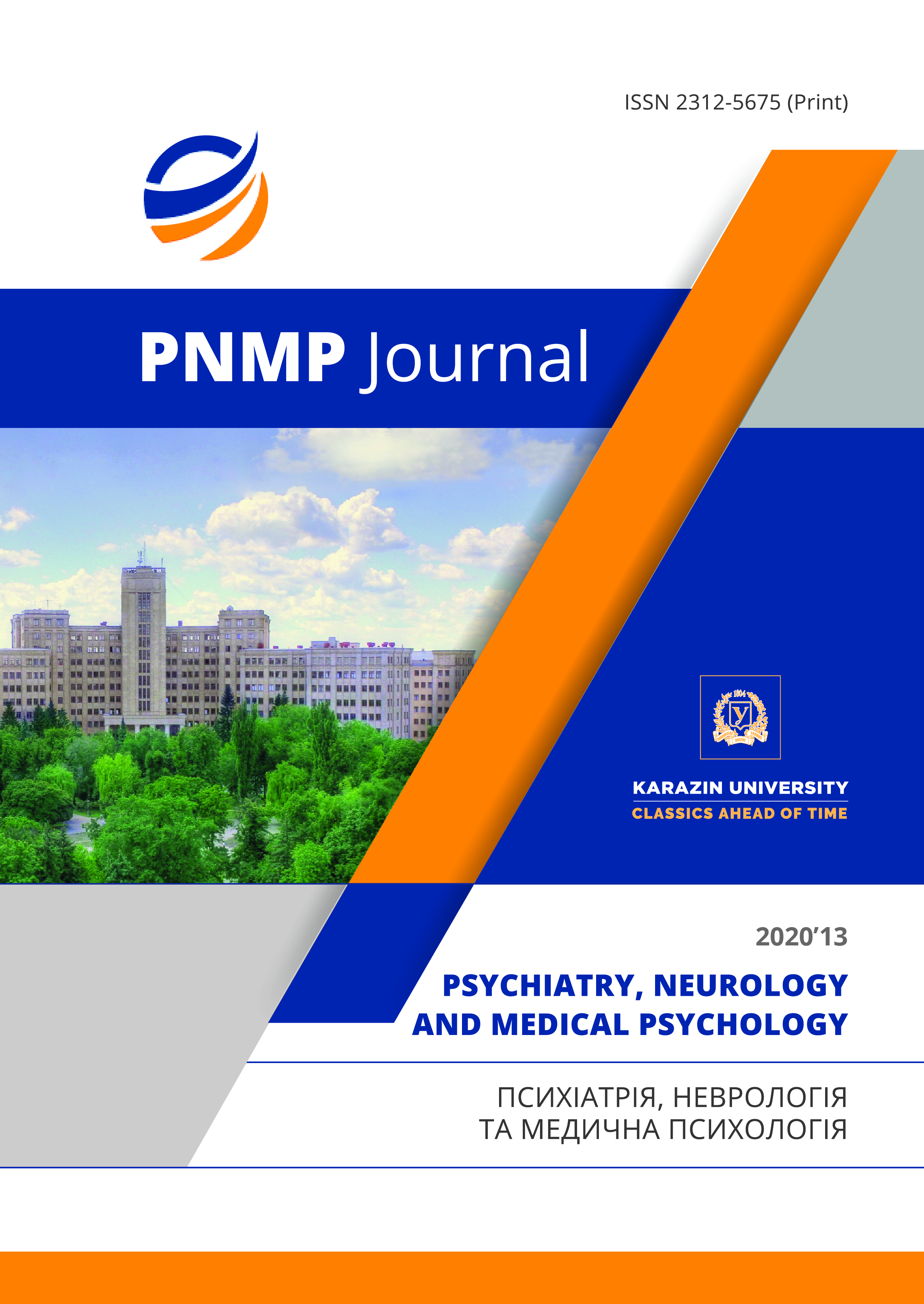Characteristics of verbal fluency in patients with a primary episode of bipolar affective disorder
Abstract
A study was conducted using the verbal fluency test of 153 patients with a primary episode of bipolar affective disorder: with prevalence of depressive symptoms (44 men and 75 women), with prevalence of manic symptoms (15 men and 8 women), and with simultaneous presence of depressive symptoms and manic symptoms phase change (6 men and 5 women).
Significant impairment of test performance in patients with depression with respect to phonetic and semantic verbal fluency was revealed: the average number of words per letter "K" per 60 sec. in all patients 14,1±2,7 words, in men – 13,8±3,1 words, in women - 14,3±2,4 words, on the letter "P" – 12,5±2,8 respectively words, 12.3±3.2 words, 12.6±2.6 words, "Male Names" – 13.1±2.6 words respectively, 12.8±3.0 words, 13.3±2,4 words; "Fruits / furniture" – 12.0±2.4 words, 11.9±2.8 words, 12.1±2.1 words. Deterioration in the performance of semantic and phonemic verbal fluency test reflects the state of bradypsychism inherent in patients with depressive variant, which manifests a slow thinking rate, difficulty concentrating attention, motor inhibition, deterioration of operational capacity, rapid exhaustion. In patients with a maniacal variant, the high speed of the test is offset by a large number of errors due to the chaotic mental activity, instability and scattering of attention, the difficulty of maintaining focus of attention: the indicators were respectively 21.7±5.7 words, 22.5±5.7 words, 20,3±6.0 words; 20.3±5.6 words, 21.1±5.5 words, 19.0±5.9 words; 20.5±5.4 words, 21.2±5.2 words, 19.1±5.7 words; 19.5±5.4 words, 20.2±5.2 words, 18.1±5.7 words. In patients with mixed variants, the indicators of verbal fluency are reduced due to the influence of complex polymorphic symptoms with rapid change of state: respectively 16.5±5.6 words, 18.2±6.1 words, 14.4±4.8 words; 14.5±5.4 words, 16.2±5.7 words, 12.4±4.8 words; 15.4±5.4 words, 17.0±5.8 words, 13.4±4.8 words; 13.9±5.0 words, 15.5±5.3 words, 12.0±4.3 words. The differences in scores across all subtests in all groups between men and women are statistically insignificant (p>0.05).
Downloads
References
Hayes J.F., Miles J., Walters K., [et al.] A systematic review and meta-analysis of premature mortality in bipolar affective disorder. Acta Psychiatrica Scandinavica. 2015. Vol. 131(6), pp. 417-425. DOI: 10.1111/acps.12408
Patel R., Shetty H., Jackson R., [et al.] Delays before diagnosis and initiation of treatment in patients presenting to mental health services with bipolar disorder. PLoS One. 2015. Vol. 10, pp. 126–129. DOI: 10.1371/journal.pone.0126530
Forty L., Ulanova A., Jones L., [et al.] Comorbid medical illness in bipolar disorder. British Journal of Psychiatry. 2014. Vol. 205, pp. 465–472. DOI: 10.1192/bjp.bp.114.152249
Sam S.P., Nisha A., Varghese P.J. Stressful Life Events and Relapse in Bipolar Affective Disorder: A Cross-Sectional Study from a Tertiary Care Center of Southern India. Indian Journal of Psychological Medicine. 2019. Vol. 41(1), pp. 61–67. DOI: 10.4103/IJPSYM.IJPSYM_113_18
Pfennig A., Correll C.U., Leopold K., [et al.] Early recognition and intervention for bipolar disorders: state of research and perspectives (German). Nervenärzt. 2012. Vol. 83, pp. 897–902. DOI: 10.1007/s00115-012-3589-3
Faedda G.L., Serra G., Marangoni C., [et al.] Clinical risk factors for bipolar disorders: a systematic review of prospective studies. Journal of Affective Disorders. 2014. Vol. 168, pp. 314–321. DOI: 10.1016/j.jad.2014.07.013
Salvatore P., Baldessarini R.J., Khalsa H.M., [et al.] Antecedents of manic versus other first psychotic episodes in 263 bipolar I disorder patients. Acta Psychiatrica Scandinavica. 2014. Vol. 129, pp. 275–285. DOI: 10.1111/acps.12170
Baldessarini R.J., Tondo L., Visioli C. First-episode types in bipolar disorder: predictive associations with later illness. Acta Psychiatrica Scandinavica. 2014. Vol. 129, pp. 383–392. DOI: 10.1111/acps.12204
Rowland T.A., Marwaha S. Epidemiology and risk factors for bipolar disorder. Therapeutic Advances in Psychopharmacology. 2018. Vol. 8(9), pp. 251–269. DOI: 10.1177/2045125318769235
Zhu Y., Womer F.Y., Leng H., [et al.] The Relationship Between Cognitive Dysfunction and Symptom Dimensions Across Schizophrenia, Bipolar Disorder, and Major Depressive Disorder. Front Psychiatry. 2019. Vol. 10, pp. 253. DOI: 10.3389/fpsyt.2019.00253
Solé B., Jiménez E., Torrent C., [et al.] Cognitive Impairment in Bipolar Disorder: Treatment and Prevention Strategies. Int J Neuropsychopharmacol. 2017. Vol. 20(8), pp. 670-680. DOI: 10.1093/ijnp/pyx032
Lima I.M.M., Peckham A.D., Johnson S.L. Cognitive deficits in bipolar disorders: Implications for emotion. Clin Psychol Rev. 2015. Vol. 59, pp. 126-136. DOI: 10.1016/j.cpr.2017.11.006
Chakrabarty T., Alamian G., Kozicky J.M., [et al.] Cognitive functioning in first episode bipolar I disorder patients with and without history of psychosis. Journal of Affective Disorders. 2018. Vol. 227, pp. 109–116. DOI: 10.1016/j.jad.2017.10.003
Sanches M., Bauer I.E., Galvez J.F., [et al.] The Management of Cognitive Impairment in Bipolar Disorder: Current Status and Perspectives. Am J Ther. 2015. Vol. 22(6), pp. 477–486. DOI: 10.1097/MJT.0000000000000120
Murri B.M., Respino M., Proietti L., [et al.] Cognitive impairment in late life bipolar disorder: Risk factors and clinical outcomes. Journal of Affective Disorders. 2019. Vol. 257, pp. 166-172. DOI: 10.1016/j.jad.2019.07.052

